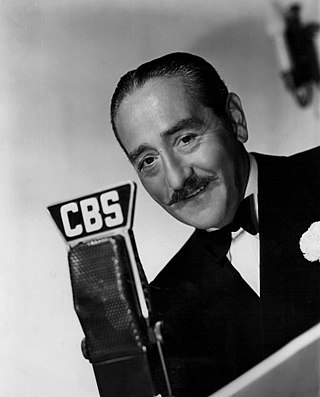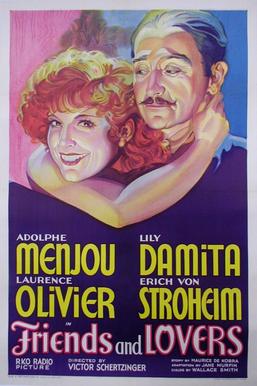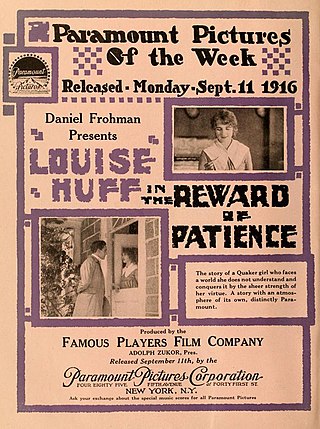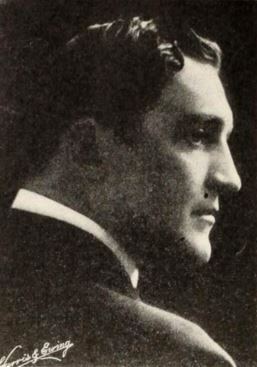Little Miss Marker is an American Pre-Code 1934 comedy-drama film directed by Alexander Hall. It was written by William R. Lipman, Sam Hellman, and Gladys Lehman after a 1932 short story of the same name by Damon Runyon. It stars Shirley Temple, Adolphe Menjou and Dorothy Dell in a story about a young girl held as collateral by gangsters. It was Temple's first starring role in a major motion picture and was crucial to establishing her as a major film star. It was inducted into the National Film Registry by the Library of Congress in 1998 and has been remade several times.

Adolphe Jean Menjou was an American actor. His career spanned both silent films and talkies. He appeared in such films as Charlie Chaplin's A Woman of Paris, where he played the lead role; Stanley Kubrick's Paths of Glory with Kirk Douglas; Ernst Lubitsch's The Marriage Circle; The Sheik with Rudolph Valentino; Morocco with Marlene Dietrich and Gary Cooper; and A Star Is Born with Janet Gaynor and Fredric March, and was nominated for an Academy Award for The Front Page in 1931.

The Goldwyn Follies is a 1938 Technicolor film written by Ben Hecht, Sid Kuller, Sam Perrin and Arthur Phillips, with music by George Gershwin, Vernon Duke, and Ray Golden, and lyrics by Ira Gershwin and Sid Kuller. The Goldwyn Follies was the first Technicolor film produced by Samuel Goldwyn.

The Milky Way is a 1936 American comedy film starring Harold Lloyd. Directed by comedy veteran Leo McCarey, the film was written by Grover Jones, Frank Butler and Richard Connell based on a play of the same name by Lynn Root and Harry Clork that was presented on Broadway in 1934.

The Mighty Barnum is a 1934 film starring Wallace Beery as P.T. Barnum. The movie was written by Gene Fowler and Bess Meredyth, adapted from their play of the same name, and directed by Walter Lang. Beery had played Barnum four years earlier in A Lady's Morals, a highly fictionalized biography of singer Jenny Lind. The supporting cast features Adolphe Menjou, Virginia Bruce as Jenny Lind, and Rochelle Hudson.

Golden Boy is a 1939 American drama romance sports film directed by Rouben Mamoulian and starring Barbara Stanwyck, Adolphe Menjou and William Holden. It is based on the 1937 play of the same title by Clifford Odets.

Broken Barriers is a 1924 American silent drama film starring James Kirkwood, Norma Shearer, and Adolphe Menjou. Directed by Reginald Barker, the film is based upon the novel of the same name by Meredith Nicholson.

Friends and Lovers is a 1931 American pre-Code drama film released by RKO Radio Pictures, directed by Victor Schertzinger, and starring Adolphe Menjou, Lili Damita, Laurence Olivier, Erich von Stroheim, and Hugh Herbert.

Sinners in Silk is a 1924 silent romantic drama film directed by Hobart Henley. The film stars Eleanor Boardman, Adolphe Menjou, Hedda Hopper, Conrad Nagel, and Jean Hersholt. It was written by Benjamin Glazer and Carey Wilson.

Clarence is a 1922 American silent comedy drama, based on the 1919 play by Booth Tarkington, produced by Famous Players–Lasky and distributed through Paramount Pictures. It was directed by William C. deMille and starred Wallace Reid in his penultimate screen appearance.
Keene Thompson was a story, scenario and screenwriter who worked in the film industry from 1920 to 1937.

Diamond Cut Diamond is a 1932 British comedy crime film directed by Maurice Elvey and Fred Niblo and starring Adolphe Menjou, Claud Allister and Benita Hume. It was made at Elstree Studios by the independent producer Eric Hakim.

A Bill of Divorcement is a 1940 film directed by John Farrow. It was also known as Never to Love and was based on a 1921 British play of the same name, written by Clemence Dane that was filmed in 1932 with John Barrymore and Katharine Hepburn.

Sing, Baby, Sing is a 1936 American musical comedy film directed by Sidney Lanfield and starring Alice Faye, Adolphe Menjou and Gregory Ratoff. It was produced and distributed by Twentieth Century Fox. Richard A. Whiting and Walter Bullock received an Academy Award nomination in Best Original Song at the 9th Academy Awards for their song "When Did You Leave Heaven".

The Bachelor's Daughters is a 1946 American comedy film directed by Andrew L. Stone and written by Stone and Frederick J. Jackson. It stars Gail Russell, Claire Trevor, Ann Dvorak, Adolphe Menjou, Billie Burke, Jane Wyatt and Eugene List. The film was released on September 6, 1946, by United Artists.

The Reward of Patience is a 1916 American drama silent film directed by Robert G. Vignola and written by Shannon Fife. The film stars Louise Huff, John Bowers, Lottie Pickford, Kate Lester, Adolphe Menjou and Gertrude Norman. The film was released on September 10, 1916, by Paramount Pictures.

Mr. District Attorney is a 1947 American film noir crime film directed by Robert B. Sinclair and starring Dennis O'Keefe, Adolphe Menjou and Marguerite Chapman. The film was based on the long-running and popular radio series Mr. District Attorney created by Phillips Lord.

For Sale is a 1924 American drama film directed by George Archainbaud and written by Fred Stanley. The film stars Claire Windsor, Adolphe Menjou, Robert Ellis, Mary Carr, Tully Marshall, and John Patrick. The film was released on June 15, 1924, by Associated First National Pictures.

Clifford Bruce (1885–1919) was a Canadian film actor of the silent era.

Courage is a 1921 American silent drama film directed by Sidney Franklin and starring Naomi Childers, Sam De Grasse and Adolphe Menjou. It was distributed by First National Pictures.


















